★★★½
“Could do with some more action, yet still more than acceptable.”
 The double-pilot. Probably deserving of a place on the FAQ is, “Why don’t you include Sarah Connor?” The reason is simply that she was a supporting character in the first two Terminator films; one essential to the plot, that’s for sure, but clearly over-shadowed by her male counterparts in both movies. The TV series finally moves Connor (Headey) front and center, and also adds an additional action-heroine dimension, in the shape of Cameron Phillips (Glau), a schoolmate of John Connor’s who turns out to be a new model of Terminator, sent back to watch over him. The show starts in 1999, a couple of years after the events of Terminator 2, but soon shifts to the present day; it thus largely ignores the timeline of Terminator 3, in which Sarah Connor was reported to have died of leukemia in 1997.
The double-pilot. Probably deserving of a place on the FAQ is, “Why don’t you include Sarah Connor?” The reason is simply that she was a supporting character in the first two Terminator films; one essential to the plot, that’s for sure, but clearly over-shadowed by her male counterparts in both movies. The TV series finally moves Connor (Headey) front and center, and also adds an additional action-heroine dimension, in the shape of Cameron Phillips (Glau), a schoolmate of John Connor’s who turns out to be a new model of Terminator, sent back to watch over him. The show starts in 1999, a couple of years after the events of Terminator 2, but soon shifts to the present day; it thus largely ignores the timeline of Terminator 3, in which Sarah Connor was reported to have died of leukemia in 1997.
The concept, as explored in the first two episodes, is very familiar: Sarah must protect son John (Dekker), so he can lead the human resistance after Skynet declares war on us. Skynet sends its unstoppable robotic henchmen back in time to take him out, but she also has an unstoppable robot of her own – this Terminator is more advanced than Arnie’s, being capable of ingesting food. However, there is further development, with the interesting idea that the future John Connor has sent back other humans, to provide a support network for Sarah in her struggle. It is only brushed against in the opening two hours, but may be developed in further episodes. There is also an FBI agent (Jones), who has been hunting Connor since her escape from the mental asylum, and her former fiancee, on whom Sarah bailed.
Glau and Headey both have action experience, from their roles in Serenity and 300 respectively, and they bring the necessary resilience to the role. Glau has a balletic grace and flexibility which helps make up for her obvious lack of size, and while there is clearly some body-doubling done, it’s mostly well-handled and the editing of the fight sequences is above-average. We also liked the deadpan portrayal she brings to the role. Headey does not yet exhibit the ferocious passion which Hamilton brought to her role, so that’s something we want to see develop, and we also hope they do not get bogged down and become a ‘Terminator of the Week’ show. It seems that time-travel may be a significant part of the story, and this would open up an almost infinite range of possibilities. This was a solid, entertaining opening, and fingers crossed the rest of the series can build on the potential.
 The rest of the series If there’s an unfinished feel to the show, that would be because it was. Thanks to the writer’s strike, the final four episodes never made it to the screen, and the storylines will be incorporated into the upcoming second series, confirmed by Fox in April. While not perhaps the makers’ fault, it undeniably had an effect, basically leaving us to turn to each other at the end [which involved a car-bomb] and go, “Is that it?” The rest of the series, however, wasn’t so terrible, though it did feel somewhat stretched. The main plot threads were extensions of the pilot: a) the Connors trying to stop Skynet from becoming active, in particular through locating a chess computer called The Turk, and b) evil Terminator Cromartie trying to stop them. There’s also c) an FBI agent (Jones) who is trying to piece together the pieces, trailing both parties, and d) the arrival of Derek Reese, the brother of Kyle and therefore John Connor’s uncle.
The rest of the series If there’s an unfinished feel to the show, that would be because it was. Thanks to the writer’s strike, the final four episodes never made it to the screen, and the storylines will be incorporated into the upcoming second series, confirmed by Fox in April. While not perhaps the makers’ fault, it undeniably had an effect, basically leaving us to turn to each other at the end [which involved a car-bomb] and go, “Is that it?” The rest of the series, however, wasn’t so terrible, though it did feel somewhat stretched. The main plot threads were extensions of the pilot: a) the Connors trying to stop Skynet from becoming active, in particular through locating a chess computer called The Turk, and b) evil Terminator Cromartie trying to stop them. There’s also c) an FBI agent (Jones) who is trying to piece together the pieces, trailing both parties, and d) the arrival of Derek Reese, the brother of Kyle and therefore John Connor’s uncle.
The extra time available to a TV series does allow for expansion, perhaps most notably that Skynet does more to try and affect the past than just send back Terminators – it is supposed to be a super-intelligent system after all. On the other hand, the action elements are significantly reined back, perhaps in association with budget restrictions. However, I particularly liked the SWAT assault on Cromartie in the final episode, set to Johnny Cash’s The Man Comes Around, which I’ve loved since they used it in the opening to the Dawn of the Dead remake. Needless to say, that goes about as well for the SWAT team as you might expect. Glau is particularly good, with her character actually developing in unexpected ways, such as discovering a taste for ballet.
However, there has been a fair bit of sniping regarding Headey, comparing her physical presence unfavourably (the word “weedy” gets used a good deal) with Linda Hamilton’s. Said one such critic: “There are two issues here: having a toothpick-thin, feeble-looking Sarah Connor is a crime against the iconography of the character; and presenting a clearly emaciated actress as a heroine is a crime against women.” Headey’s response was blunt and to the point: “It’s a TV show, for God’s sake!” – and I’m inclined to agree. We’re dealing with a series about time-travelling robots here, folks. If you seek role models for your body here, there’s probably no hope for you. Here’s to the second series, especially if there’s more ass-kicking from Headey and Glau.
Dir: David Nutter and others
Star: Lena Headey, Thomas Dekker, Summer Glau, Richard T. Jones






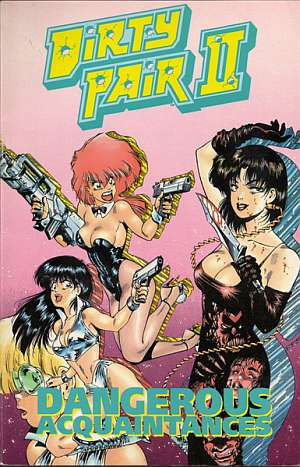 It’s been at least a decade since I read this – probably more – but it is still a thoroughly-enjoyable read, and a major improvement in just about every way (plotting, art, pacing, imagination and characterization) over the first stab. Of particular note is the solid way in which the two separate threads of the story are woven together. While on holiday, Kei and Yuri bump into Shasti, a former colleague of theirs in the WWWA. She was actually an android, who went rogue after a criminal’s personality was implanted into her, part of a (failed) experiment to see if it would help with his capture to have her think like him. She’s now apparently leading a group of “freedom fighters” who are planning to hijack a luxurious space-liner, crammed with VIPs and new technology. Has Shasti gone all political? Or, if not, what is she up to?
It’s been at least a decade since I read this – probably more – but it is still a thoroughly-enjoyable read, and a major improvement in just about every way (plotting, art, pacing, imagination and characterization) over the first stab. Of particular note is the solid way in which the two separate threads of the story are woven together. While on holiday, Kei and Yuri bump into Shasti, a former colleague of theirs in the WWWA. She was actually an android, who went rogue after a criminal’s personality was implanted into her, part of a (failed) experiment to see if it would help with his capture to have her think like him. She’s now apparently leading a group of “freedom fighters” who are planning to hijack a luxurious space-liner, crammed with VIPs and new technology. Has Shasti gone all political? Or, if not, what is she up to? This is a competently-made but ultimately forgettable film – it feels very much like a TVM, albeit for one of the slightly-more liberal channels. Hemingway plays Secret Service agent Lynn Delaney, who has to look after the Vice-President, when their place crashes in the Pacific. Of course, in the way things only happen in Hollywood movies, the island to which the struggle is a rebel outpost, and the VP is a former soldier, with more-than adequate combat skills of his own. Which extend to more than shooting people in the face, Dick Cheney please note. Meanwhile, there’s a lot of tension with female journalist Sharon Serrano (Bennett), who is also among the survivors; this includes tension of a sexual kind, if you know what I mean, and I think you do. Like I said: one of the slightly-more liberal channels. However, it’s nice that no big thing is made of this; you’re not whacked over the head with anyone’s sexual orientiation, as in D.E.B.S. [Curiously, even the nods in this direction are edited out from some releases]
This is a competently-made but ultimately forgettable film – it feels very much like a TVM, albeit for one of the slightly-more liberal channels. Hemingway plays Secret Service agent Lynn Delaney, who has to look after the Vice-President, when their place crashes in the Pacific. Of course, in the way things only happen in Hollywood movies, the island to which the struggle is a rebel outpost, and the VP is a former soldier, with more-than adequate combat skills of his own. Which extend to more than shooting people in the face, Dick Cheney please note. Meanwhile, there’s a lot of tension with female journalist Sharon Serrano (Bennett), who is also among the survivors; this includes tension of a sexual kind, if you know what I mean, and I think you do. Like I said: one of the slightly-more liberal channels. However, it’s nice that no big thing is made of this; you’re not whacked over the head with anyone’s sexual orientiation, as in D.E.B.S. [Curiously, even the nods in this direction are edited out from some releases]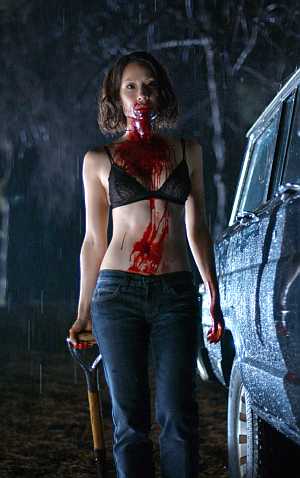 The main obstacle to this even reaching average is probably a first-half structure that is, for no readily apparent season, entirely fractured. Scenes appear entirely out of order, with no explanation: why is our heroine now waking up in a morgue? And the problem is, what the film has to offer is so pedestrian, you can’t be bothered to start putting the pieces together. Liu plays Sadie Blake, a journalist investigating the shady underground side of goth culture, who ends up finding a clan of vampires are on top of the food chain, just before becoming one of their victims. However, instead of taking her undeath lying down, she vows revenge and, accompanied by a rogue cop (Chiklis, you’ll not be surprised to learn), begins working her way up said food-chain.
The main obstacle to this even reaching average is probably a first-half structure that is, for no readily apparent season, entirely fractured. Scenes appear entirely out of order, with no explanation: why is our heroine now waking up in a morgue? And the problem is, what the film has to offer is so pedestrian, you can’t be bothered to start putting the pieces together. Liu plays Sadie Blake, a journalist investigating the shady underground side of goth culture, who ends up finding a clan of vampires are on top of the food chain, just before becoming one of their victims. However, instead of taking her undeath lying down, she vows revenge and, accompanied by a rogue cop (Chiklis, you’ll not be surprised to learn), begins working her way up said food-chain.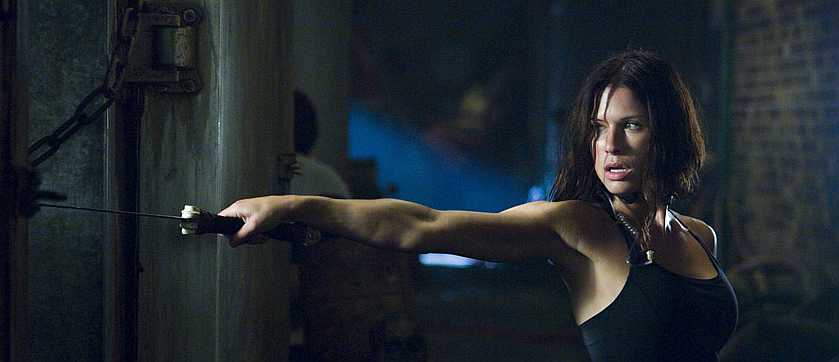 ★★★½
★★★½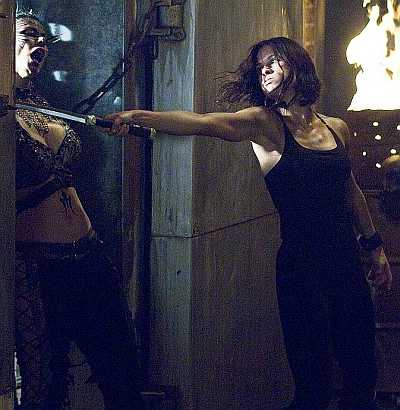 In the near future (next week, actually at the time of going to press), Glasgow falls prey to the Reaper virus, which is exactly what it sounds like. The government in London deal with the problem by building a 30-foot wall along the border and sealing off Scotland – which is basically the approach taken by the government to problems in Scotland since, oh, about 1707. [Hello, born there!] 30 years later, however, the virus breaks out in London, and all of a sudden, the information that people are still alive in Scotland, suggesting they found a cure, is now of more than academic interest. To get the cure, they send Eden (Mitra) up North, to find Kane (McDowell, appearing in about two scenes, then taking his salary and leaving), who might just have the solution. However, things do not go as planned, needless to say, not least because Glasgow is inhabited by nothing but psychopathic thugs with poor dress sense and bad skin, stuck in the past. So, no change, then. [Hello,
In the near future (next week, actually at the time of going to press), Glasgow falls prey to the Reaper virus, which is exactly what it sounds like. The government in London deal with the problem by building a 30-foot wall along the border and sealing off Scotland – which is basically the approach taken by the government to problems in Scotland since, oh, about 1707. [Hello, born there!] 30 years later, however, the virus breaks out in London, and all of a sudden, the information that people are still alive in Scotland, suggesting they found a cure, is now of more than academic interest. To get the cure, they send Eden (Mitra) up North, to find Kane (McDowell, appearing in about two scenes, then taking his salary and leaving), who might just have the solution. However, things do not go as planned, needless to say, not least because Glasgow is inhabited by nothing but psychopathic thugs with poor dress sense and bad skin, stuck in the past. So, no change, then. [Hello, 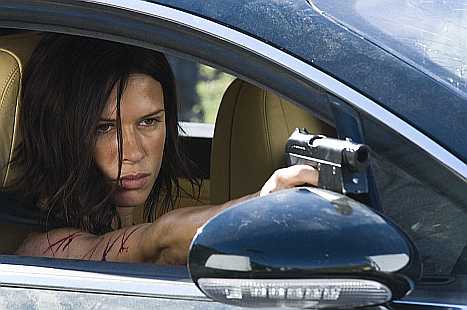 It all builds to a monumental car-chase, though you have to suspend disbelief there, as apparently Bentley cars will start right out of the crate, even if they’ve been sitting there for thirty years. You can also plough them through an exploding bus, amongst a litany of other torments, and they’ll come out the other side with barely a scratch. Again, if you’re going to ground your film in the ‘real world’, admittedly a questionable concept given the plot synopsis above (and I haven’t even got to the more outrageous elements yet!), then mis-steps such as these should be avoided. They’ll just give the more moronic end of the critical fraternity – paging Jeff Otto – blunt objects with which to whack your film about the head, as they ride off on their high horse. They only bothered me slightly, since I was already in full-on disbelief suspension, and since the resulting car-chase was cheerfully destructive, I’m inclined to give it some slack.
It all builds to a monumental car-chase, though you have to suspend disbelief there, as apparently Bentley cars will start right out of the crate, even if they’ve been sitting there for thirty years. You can also plough them through an exploding bus, amongst a litany of other torments, and they’ll come out the other side with barely a scratch. Again, if you’re going to ground your film in the ‘real world’, admittedly a questionable concept given the plot synopsis above (and I haven’t even got to the more outrageous elements yet!), then mis-steps such as these should be avoided. They’ll just give the more moronic end of the critical fraternity – paging Jeff Otto – blunt objects with which to whack your film about the head, as they ride off on their high horse. They only bothered me slightly, since I was already in full-on disbelief suspension, and since the resulting car-chase was cheerfully destructive, I’m inclined to give it some slack. “Like The Prophecy, made for 75 cents and without Christopher Walken.”
“Like The Prophecy, made for 75 cents and without Christopher Walken.” Things build to a final showdown in a warehouse, where the makers finally locate their supply of fake blood, which has been largely notable by its absence for the first hour, and it is quite effective. I do wonder why the angels, on both sides, don’t make better uses of their powers, though must also say, said powers are also somewhat crap: if I was responsible for holding the balance between good and evil, I’d want something better than the ability to turn into a fat guy. Overall, one would quite like to see this remade as a big-budget work, because the ideas here are good; with a good effects studio – and significantly better fight choreography – this has a lot of potential. However, Hollywood appears too busy remaking mostly-mediocre Asian horror to notice. We are therefore stuck with a cheap version, whose flaws likely distract too much from its merits for this to find a wide audience.
Things build to a final showdown in a warehouse, where the makers finally locate their supply of fake blood, which has been largely notable by its absence for the first hour, and it is quite effective. I do wonder why the angels, on both sides, don’t make better uses of their powers, though must also say, said powers are also somewhat crap: if I was responsible for holding the balance between good and evil, I’d want something better than the ability to turn into a fat guy. Overall, one would quite like to see this remade as a big-budget work, because the ideas here are good; with a good effects studio – and significantly better fight choreography – this has a lot of potential. However, Hollywood appears too busy remaking mostly-mediocre Asian horror to notice. We are therefore stuck with a cheap version, whose flaws likely distract too much from its merits for this to find a wide audience. Let me be perfectly clear: one of the above stars is purely for entertainment value, since this is one of those movies which is so bad as to become enjoyable, purely on that level. There is hardly an aspect of this film which is not badly-executed: the script is badly thought-out, the performances are almost without exception woeful, and the continuity has to be among the worst of all time. One actress goes from a colored top and no bra, to a bra, to a white top and no bra, in successive scenes, while another enters a pool in a bikini, comes out topless, and five second later has the top back on and is dry. We laughed like drains, I tell you. Oh, you want the plot? Mousy scientist Helen (Kitchen) is trying to find a brain chemical that will unleash humanity’s psychic powers, using imprisoned serial-killer Horn (Marks) as her source. Even though the resulting chemical is green and glowing, in a way not seen since Re-Animator, she decides to test it on herself. This unleashes her alter-ego, Cassandra, who embarks on a plot to enslave mankind to her will. It’s up to her assistant Gary (Klitzner), along with a homicide detective (Rivers) to stop her.
Let me be perfectly clear: one of the above stars is purely for entertainment value, since this is one of those movies which is so bad as to become enjoyable, purely on that level. There is hardly an aspect of this film which is not badly-executed: the script is badly thought-out, the performances are almost without exception woeful, and the continuity has to be among the worst of all time. One actress goes from a colored top and no bra, to a bra, to a white top and no bra, in successive scenes, while another enters a pool in a bikini, comes out topless, and five second later has the top back on and is dry. We laughed like drains, I tell you. Oh, you want the plot? Mousy scientist Helen (Kitchen) is trying to find a brain chemical that will unleash humanity’s psychic powers, using imprisoned serial-killer Horn (Marks) as her source. Even though the resulting chemical is green and glowing, in a way not seen since Re-Animator, she decides to test it on herself. This unleashes her alter-ego, Cassandra, who embarks on a plot to enslave mankind to her will. It’s up to her assistant Gary (Klitzner), along with a homicide detective (Rivers) to stop her.
 It should be entirely clear which series the distributors of Dark Queen are hoping you’ll mistake their film for an entry in. In reality, this is not fit to lick Natasha Henstridge’s boots; it’s really much closer to Dr. Jekyll and Sister Hyde, yet as such, is still a dismal failure – that whirring sound you hear is Robert Louis Stevenson spinning in his grave. However, even as it fails on just about every cinematic level, fans of bad cinema may find this has its merits. However, even there, it may still divide opinions: I had rather more fun with this than Chris [she, on the other hand, liked the midget-vampire movie, Ankle Biters, which I found almost unwatchable]. You can certainly sense where they were aiming with this; however, the execution is, frankly, so awful as to drain any potential from it, almost entirely.
It should be entirely clear which series the distributors of Dark Queen are hoping you’ll mistake their film for an entry in. In reality, this is not fit to lick Natasha Henstridge’s boots; it’s really much closer to Dr. Jekyll and Sister Hyde, yet as such, is still a dismal failure – that whirring sound you hear is Robert Louis Stevenson spinning in his grave. However, even as it fails on just about every cinematic level, fans of bad cinema may find this has its merits. However, even there, it may still divide opinions: I had rather more fun with this than Chris [she, on the other hand, liked the midget-vampire movie, Ankle Biters, which I found almost unwatchable]. You can certainly sense where they were aiming with this; however, the execution is, frankly, so awful as to drain any potential from it, almost entirely.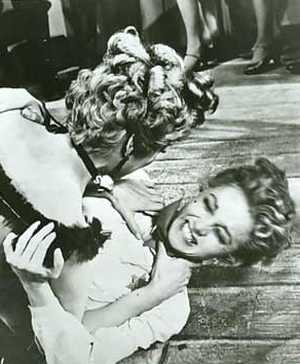 While Corman is better known now as a producer of schlock-horror, he has tried his hand at just about every genre in his time. This was his last stab at the Western, with Garland playing Rose Hood, who takes over as the marshal of Oracle, after her husband is gunned down. However, she incurs the wrath of local saloon-owner Erica Page (Hayes, best known for the title role in Attack of the 50 Ft. Woman), who is running a property-acquisition scheme, based on her hopes for the railroad to come to town. She brings hired killer Cane Miro (Ireland) up from Tombstone, only for him to fall for his intended victim, who is unaware of his mission. Which is surprising, since he is dressed from head to toe in black – even at age seven, when I used to watch The Virginian with my father, I knew this indicated an utterly irredeemable nature.
While Corman is better known now as a producer of schlock-horror, he has tried his hand at just about every genre in his time. This was his last stab at the Western, with Garland playing Rose Hood, who takes over as the marshal of Oracle, after her husband is gunned down. However, she incurs the wrath of local saloon-owner Erica Page (Hayes, best known for the title role in Attack of the 50 Ft. Woman), who is running a property-acquisition scheme, based on her hopes for the railroad to come to town. She brings hired killer Cane Miro (Ireland) up from Tombstone, only for him to fall for his intended victim, who is unaware of his mission. Which is surprising, since he is dressed from head to toe in black – even at age seven, when I used to watch The Virginian with my father, I knew this indicated an utterly irredeemable nature.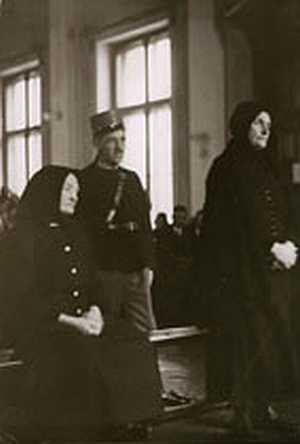 You wouldn’t know it to look at the sleepy Hungarian village of Nagyrév [population: 872], but there was a time between the world wars when this was the murder capital of the world. Between 1914 and 1929, an estimated
You wouldn’t know it to look at the sleepy Hungarian village of Nagyrév [population: 872], but there was a time between the world wars when this was the murder capital of the world. Between 1914 and 1929, an estimated  If you thought the novel was a quick read, I got through Biohazards during lunch, and that’s only with 30 minutes. Still, being a comic-book, we must cut it some slack, though I can’t say I find action (and there’s a
If you thought the novel was a quick read, I got through Biohazards during lunch, and that’s only with 30 minutes. Still, being a comic-book, we must cut it some slack, though I can’t say I find action (and there’s a